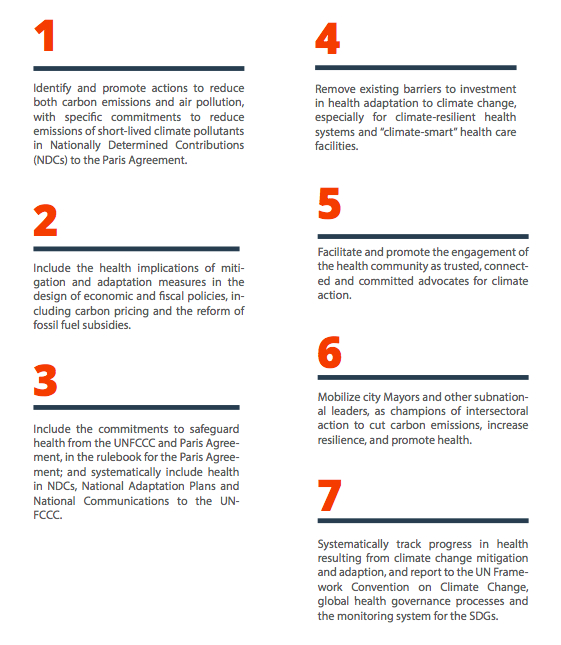Meeting the goals of the Paris Agreement could save about a million lives a year worldwide by 2050 through reductions in air pollution alone, according to a new report led by the World Health Organization.
The COP24 Special report: Health & Climate Change also indicates that the value of health gains from climate action would be approximately double the cost of mitigation policies at global level; the cost-benefit ratio is even higher in countries like China and India.
The report, which the WHO led and delivered on behalf of the global public health community today at the United Nations Climate Change Conference (COP24) in Katowice, Poland, highlights why health considerations are critical to the advancement of climate action and outlines key recommendations for policy makers.
“The health care benefits give you twice the return on investment that it costs you to mitigate climate change,” said Team Leader, Climate Change and Health at the WHO, Dr Diarmid Campbell-Lendrum, the lead author of the report.
“So we should no longer really be talking about the cost of mitigation– we should be talking about what the benefits are to people’s health and to sustainable development, in investing in what needs to be done to address climate change,” he said.
Exposure to air pollution causes 7 million deaths worldwide every year and costs an estimated US$ 5.11 trillion in welfare losses globally. The main driver of climate change is fossil fuel combustion which is also a major contributor to air pollution.
“The International Monetary Fund… a couple of years ago estimated that polluting fuels were effectively getting a $5 trillion a year benefit– a subsidy, as they call it, because they were not having to include health damages there that the polluting fuels caused in the cost of the fuels,” said Dr Campbell-Lendrum.
“And, for comparison, they pointed out that’s approximately the same figure that all governments around the world spend on health each year, and that providing that is a break basically, is a benefit to polluting fuels. So either you need to take into account the gains in health or you need to put it into your economic equation,” he said.
In the 15 countries that emit the most greenhouse gas emissions, the health impacts of air pollution are estimated to cost more than 4 per cent of their GDP. Actions to meet the Paris goals would cost around 1 per cent of global GDP.
“The true cost of climate change is felt in our hospitals and in our lungs. The health burden of polluting energy sources is now so high, that moving to cleaner and more sustainable choices for energy supply, transport and food systems effectively pays for itself,” said Dr Maria Neira, WHO Director of Public Health, Environmental and Social Determinants of Health.
“When health is taken into account, climate change mitigation is an opportunity, not a cost,” she said.
“The Paris Agreement is potentially the strongest health agreement of this century,” said Dr Tedros Adhanom Ghebreyesus, Director-General of WHO. “The evidence is clear that climate change is already having a serious impact on human lives and health. It threatens the basic elements we all need for good health – clean air, safe drinking water, nutritious food supply and safe shelter – and will undermine decades of progress in global health. We can’t afford to delay action any further.”
The report provides recommendations for governments on how to maximize the health benefits of tackling climate change and avoid its worst health impacts.

Recommendations of the COP24 Special report: Health & Climate Change. Source: WHO
The report was released as part of a WHO series of events on health and climate change at the COP24.
is the third major publication launched in less than a fortnight that details the links between health and climate change, the future and opportunity costs to health of not taking action towards the Paris Agreement climate goals, and, conversely, the many likely benefits and positive knock-on effects of taking action.
Last week, the 2018 report of the Lancet Countdown on health and climate change and the Fourth National Climate Assessment of the United States Environmental Protection Agency detailed the many and varied ways climate change already impacts human health and the ways in which it would erode gains from progress made in public health and environment, as well as potential benefits of action.
All three make the point that switching to low-carbon energy sources would not only improve air quality but provide additional opportunities for immediate health benefits. For example, introducing active transport options such as cycling would help increase physical activity that could help prevent diseases like diabetes, cancer and heart disease.
Read the press release here.
Read the full report here: COP24 Special report: Health & Climate Change
Watch the launch event here by webcast on demand.
Watch the side event here by webcast on demand.
Banner photo by PIUS UTOMI EKPEI/AFP/Getty Images